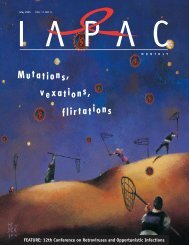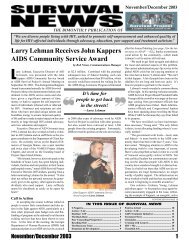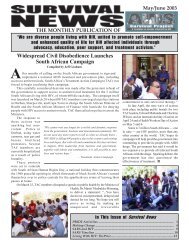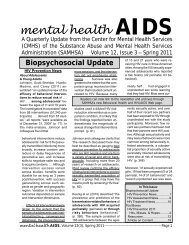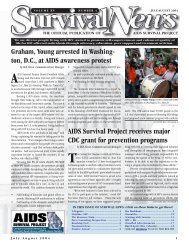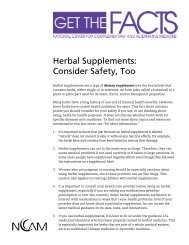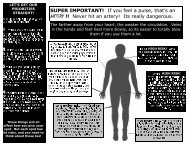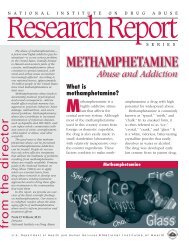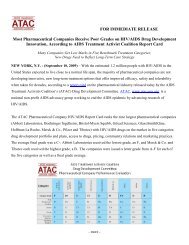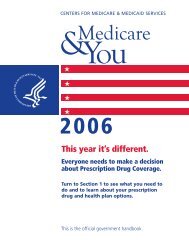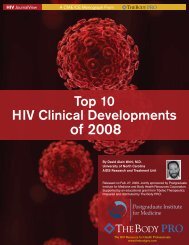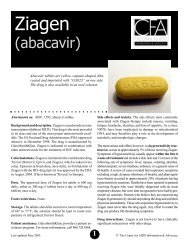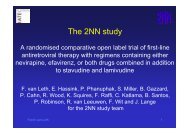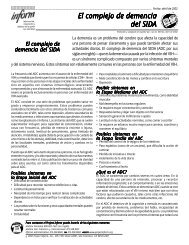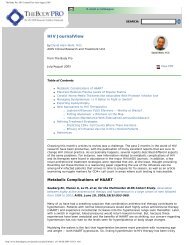WELLNESS STARTS WITH AWARENESS - CD8 T cells - The Body
WELLNESS STARTS WITH AWARENESS - CD8 T cells - The Body
WELLNESS STARTS WITH AWARENESS - CD8 T cells - The Body
You also want an ePaper? Increase the reach of your titles
YUMPU automatically turns print PDFs into web optimized ePapers that Google loves.
“I borrowed my brother’s van, we got<br />
a vendors license and set up a table, and<br />
then a couple of amazing things happened.<br />
First, we couldn’t take money from people’s<br />
hands fast enough once they found out what<br />
we were doing. More importantly though,<br />
people with AIDS from all over the country<br />
started coming up to us saying, ‘Th is is so<br />
awesome! I would love to work the two days<br />
a week when I’m not sick. Do you know of<br />
anything like this in my city? Are you guys<br />
gonna franchise?’ ”<br />
By the end of the weekend, they learned<br />
that a project similar to Nightsweats and<br />
T-<strong>cells</strong> was operating in New York City. It<br />
was called Multitasking Systems, and it<br />
was a temp service staff ed with people with<br />
AIDS.<br />
Unfortunately, the man who told them<br />
about this other organization was suff ering<br />
from severe dementia, and wasn’t able<br />
to provide any type of contact information<br />
(and you have to remember that this was the<br />
early 1990s, and the luxury of the Internet<br />
was not as widely available).<br />
For the sake of exchanging ideas about<br />
running an operation such as theirs, Gil<br />
was determined to connect with the folks<br />
who had organized Multitasking Systems.<br />
His persistence paid off and in 1994 he<br />
co-presented a groundbreaking workshop<br />
with them at the National Skills Building<br />
Conference, which later became the United<br />
States Conference on AIDS.<br />
“Th is was the fi rst time that employment<br />
issues for people with AIDS, not talking<br />
about giving us disability but talking<br />
about getting us jobs, was addressed on a<br />
national level,” Gil remembers.<br />
“But out of 3,500 people, only six people<br />
showed up to the workshop. Everyone was<br />
trying to bury us back then. People thought<br />
we were nuts. Th ey would say, ‘People with<br />
AIDS can’t do that much work. We can’t run<br />
a business staff ed with PWAs.’ ”<br />
Infuriated, Gil reminded them of the<br />
contrary.<br />
“I said, ‘Well, who do you think built<br />
your agencies? We built a whole care system<br />
for people with AIDS. Th ere is nothing<br />
we can’t do. We’ve already proved that to<br />
the world.’ ”<br />
Th e seeds that were planted that day<br />
were not lost on unfertile ground. One of<br />
the six attendees was from Oklahoma City<br />
and, upon returning to his home town, he<br />
wrote a grant and was funded to start a<br />
temp service there.<br />
PA • September / October 2008 • tpan.com • positivelyaware.com<br />
Positively Aware<br />
Nightsweats and T-<strong>cells</strong> remained a<br />
unique entity unlike this newly created<br />
organization, or even like Multitasking<br />
Systems, in that it has opted to not go the<br />
not-for-profi t route.<br />
“We don’t want to have to stop doing<br />
the kinds of shirts we do,” says Gil (they<br />
are currently working on a shirt in support<br />
of Barack Obama, to complement the ones<br />
that strongly criticize and ridicule the current<br />
administration). “We want this to be<br />
about being self-reliant.”<br />
Th at self-reliance, however, has not<br />
come without cost. When asked about the<br />
single most challenging aspect of running a<br />
shop such as Nightsweats and T-<strong>cells</strong>, both<br />
Michael and Gil respond, without hesitation,<br />
that it is getting work.<br />
“Sometimes just getting people within<br />
the AIDS industry to support us is a challenge,”<br />
said Gil. “Th e AIDS industry has<br />
become an industry, and people change<br />
jobs all the time. We’re constantly having<br />
to re-introduce ourselves to people in ASOs<br />
all over the country.<br />
“We travel to conferences to reach people<br />
with AIDS and to harass the drug companies.<br />
We’ve never had a pharma company<br />
do business with us. All those thousands<br />
and thousands of bags you see at all those<br />
conferences. We’ve never been allowed to<br />
bid on one of those bags. Th ey get them<br />
mass produced in China somewhere, where<br />
they can pay less money.”<br />
To sustain itself and continually<br />
increase opportunity for people with AIDS,<br />
Nightsweats and T-<strong>cells</strong> extended the<br />
reach of its line of shirts to store shelves in<br />
places as far away as Hawaii and London.<br />
Th ey have also maintained a loyal base of<br />
customers who frequently use them for<br />
custom work. Th eir customer base ranges<br />
from families wanting T-shirts for their<br />
annual reunions, to the restaurant on the<br />
corner, agencies such as TPAN and Broadway<br />
Cares, to Bernadette Peters and Mary<br />
Tyler Moore.<br />
“Our prices are competitive and we do<br />
quality work,” said Gil. “Th e people who created<br />
Adobe Photoshop do business with us.<br />
In fact, they sent somebody to us for advice<br />
on how to do the four-color process.”<br />
Gil admits, though, that even with all<br />
of the fi nancial obstacles, Nightsweats and<br />
T-<strong>cells</strong> is very diff erent from other companies,<br />
where the bottom line is money.<br />
“Our bottom line is staying alive,” he<br />
says.<br />
In 1995, Gil’s deteriorating health<br />
forced him to quit his job in the hospital<br />
and take on a more full-time role with<br />
Nightsweats and T-<strong>cells</strong>.<br />
“I just got too sick to continue working<br />
there,” he says. “I was exposed to way<br />
more pathogens than most people with HIV<br />
would normally be exposed to.”<br />
And, the truth of the matter is, a work<br />
environment such as what he’s helped to<br />
create at Nightsweats and T-<strong>cells</strong> is far more<br />
favorable for people with AIDS.<br />
He recalls an incident where a reporter<br />
was coming to the shop to interview him<br />
about the work that Nightsweats and T-<strong>cells</strong><br />
is doing, and he had an “accident” following<br />
his morning dose of meds.<br />
“I was able to yell from the bathroom,<br />
‘Somebody go and get my spare shorts<br />
because the reporter from the gay press is<br />
on his way,’ ” he says, laughing hysterically.<br />
“And that could happen fi ve times a week<br />
here and nobody would bat an eye.”<br />
He says that organizations like Nightsweats<br />
and T-<strong>cells</strong> are still relevant today<br />
because, contrary to what you hear, the<br />
AIDS epidemic is not over. It simply has a<br />
diff erent face. And, even in 2008, employment<br />
opportunities for people with AIDS<br />
are limited.<br />
All of the local social workers know<br />
Nightsweats and T-<strong>cells</strong>, and call upon them<br />
when they’re trying to fi nd work for some of<br />
their most “unemployable” clients—former<br />
sex workers with no traceable work history,<br />
or men who have been recently released<br />
from prison who no one will hire because<br />
of their rap sheet.<br />
Th e social workers call on Nightsweats<br />
and T-<strong>cells</strong> because they know that such<br />
people, particularly the ones who are also<br />
infected with HIV, will be welcomed with<br />
open arms at Nightsweats and T-<strong>cells</strong>.<br />
One PWA staff member came to Nightsweats<br />
and T-<strong>cells</strong> aft er 20 years in prison.<br />
With two years of work there under his belt,<br />
he was able to step up to a much better position<br />
somewhere else, where he’s been for the<br />
past three years.<br />
“Someone who has been selling their<br />
body on the streets for the last 15 years can<br />
sell the hell out of shirts,” Gil says seriously<br />
of some of the staff members who’ve come<br />
their way. “Th ey know how to sell. Th ey’ve<br />
been selling their whole lives. Th ey are<br />
salespeople. It’s just a matter of us looking<br />
diff erently at our surroundings. And, hopefully,<br />
we are a role model for that.” e<br />
39



